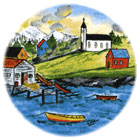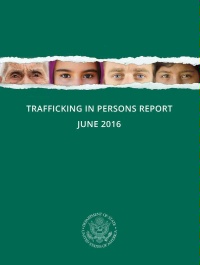|
Since the Mercy mission from Baggot Street Convent arrived in St. John’s, Newfoundland, Canada in 1842, six months after Catherine Mc Auley’s death, the needs of women and children are the focus of the Sisters of Mercy of Newfoundland.
 The prevalence of Human Trafficking in Newfoundland/Labrador has increased significantly over the last few years. Individual Sisters had contact with women who suffered greatly through prostitution or as a result of being trafficked and their stories touched many hearts. The prevalence of Human Trafficking in Newfoundland/Labrador has increased significantly over the last few years. Individual Sisters had contact with women who suffered greatly through prostitution or as a result of being trafficked and their stories touched many hearts.
Awareness Raising
As time passed it became evident that the problem of human trafficking was more extensive and more widespread than was initially believed. Due to the oil and gas industries in Newfoundland there is a booming sex industry, and human trafficking is part of that growth. Catholic and Christian groups realised too, that this new form of slavery could not be eradicated while working alone, but needed the collaboration of all concerned parties.
Supported by her Mercy community, Margie Taylor rsm from St John’s, is among those active in engaging with issues of human trafficking. She has been raising awareness about this form of slavery and the damage it is doing to individuals. In her address to individual groups e.g. Catholic Women’s League at their provincial meeting, Margie uses stories from local and global scenes to impress upon the participants the many forms of human trafficking, and addresses many of the current related issues. Margie believes that ‘we need to inspire the strong to protect the weak, the rich to champion the poor as Cathrine McAuley did, and the powerful to build capacities for sustained living.’
Networking with Others
The Sisters of Mercy of Newfoundland, together with other religious congregations, NGOs and police force members became part of the Newfoundland and Labrador Human Trafficking Committee, founded in 2009 following a related workshop www.newfoundland-labradorhumantrafficking. The aim of the committee was to end human trafficking through public awareness, providing services to trafficked persons, taking actions on related advocacy issues, providing resources, and training support for law enforcement personnel. A number of Mercy Sisters are engaged with this group.
Their objectives are to:-
1) Ensure a coordinated effort to provide immediate and follow-up services to victims of human trafficking.
2) Raise awareness of human trafficking in the community and create a network of contacts so that victims of human trafficking can be identified and supported. A Coalition Against the Sexual Exploitation of Youth - CASEY- was formed and developed appropriate resources for young people.
Later the initial Committee was subsumed into the Newfoundland and Labrador Coalition against Human Trafficking, established in 2013 http://www.nlcoalitionagainsthumantrafficking.com . Its aim is “to educate and inform the community about Human Trafficking and the partnerships essential to address this modern day form of slavery.” In October of that year it facilitated a workshop on human trafficking with religious leaders in Newfoundland/Labrador. Sister Margie contributed to the facilitation and was later invited to join the committee. The very human stories that were shared resulted in a deeper understanding of the hideous behaviour of those who engage in this form of slavery. In concluding the workshop the Coalition requested prayers for their work and for all who suffer at the hands of traffickers. Prayer cards were designed for distribution. Report on Work in the area of Human trafficking:
To contribute to awareness raising, a conference on Human Trafficking: Breaking the Chains, was held in Toronto, Ontario. This conference was sponsored by the Institute of the Blessed Virgin Mary -IBVM-Loreto Sisters. Over 200 people attended from many walks of life, including many from the Mercy family. Elizabeth Davis rsm facilitated this conference and concluded by encouraging each person to leave, committed to at least one new action which he or she would undertake to add to the efforts of all those determined to end the slavery of human trafficking. A full report of this conference can be accessed from Breaking the Chains-Initiatives on Human Trafficking
Learning Experience
Sr. Mary Tee rsm facilitated a 2-day follow-up workshop by the Coalition in April 2014, with the topic The Global Slave Trade in Newfoundland and Labrador, Canada. In keeping with the Coalition’s mandate the workshop’s objecives were: 1) to educate and inform the community about human trafficking and 2) to identify the partnerships that are essential to address this modern day form of slavery. Approximately 110 participants took part, representing a wide range of targeted departments and organisations.
The workshop speakers were chosen for the depth and expance of their experience with people who were trafficked. The event was intended to begin the process towards the collaborative development of human trafficking response network in the community. The speakers inputs deepened the understanding of participants re the complexity and global nature of human trafficking and the importance of listening to the experiences of each individual victim. The conference concluded with round table discussions resulting in an Action Plans for the future.
Spanner in the Works Theatre
During the 20th Anniversary of the formation of Mercy International Association in Dublin in 2014 the play Diablo was performed by the Spanner in the Works Theatre Company from Belfast, Ireland to expand our consciousness on the horrors of human trafficking. Later the Sisters in Newfoundland co-sponsored and co-hosted a week-long running of the play Diablo, performed during the Human Trafficking Awareness week in Newfoundland. The Coalition also hosted a conference with a follow-up participants’ workshop, which developed and facilitated a training program for the Royal Newfoundland Constabulary.
When it comes to addressing social issues in a locality, the Sisters of Mercy of Newfoundland are deeply involved. They are influential in participation and facilitation, and in working in partnership and collaboration with many concerned groups and individuals on the many issues raised by human trafficking.
 Trafficking in Persons (TIP) Report 2016 Trafficking in Persons (TIP) Report 2016
The Trafficking in Persons Report, or TIP Report, is an annual report issued by the U.S. State Department's Office to Monitor and Combat Trafficking in Persons. It ranks governments based on US research of their efforts to acknowledge and combat human trafficking.
In the TIP Report, the Department of State places each country onto one of three tiers based on the extent of their governments’ efforts to comply with the “minimum standards for the elimination of trafficking” found in Section 108 of the TVPA.
View the TIP Report 2016 for Canada (Tier 1)
|



